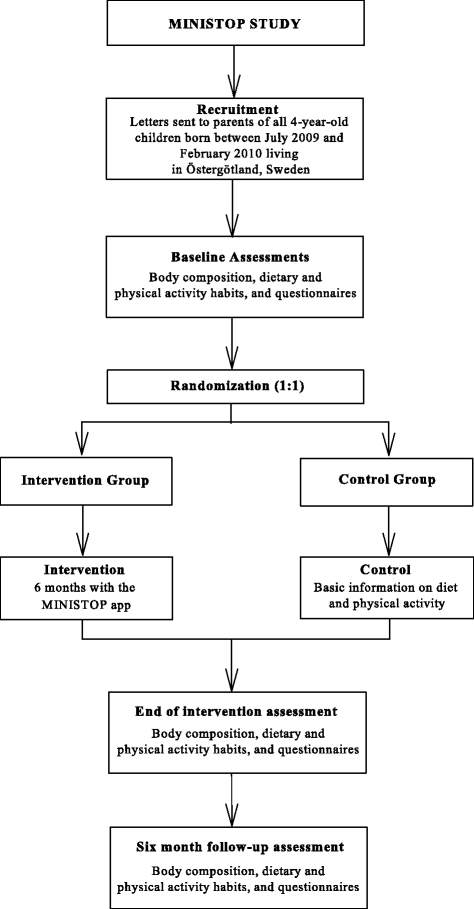A web- and mobile phone-based intervention to prevent obesity in 4-year-olds (MINISTOP): a population-based randomized controlled trial
- PMID: 25886009
- PMCID: PMC4330598
- DOI: 10.1186/s12889-015-1444-8
A web- and mobile phone-based intervention to prevent obesity in 4-year-olds (MINISTOP): a population-based randomized controlled trial
Abstract
Background: Childhood obesity is an increasing health problem globally. Overweight and obesity may be established as early as 2-5 years of age, highlighting the need for evidence-based effective prevention and treatment programs early in life. In adults, mobile phone based interventions for weight management (mHealth) have demonstrated positive effects on body mass, however, their use in child populations has yet to be examined. The aim of this paper is to report the study design and methodology of the MINSTOP (Mobile-based Intervention Intended to Stop Obesity in Preschoolers) trial.
Methods/design: A two-arm, parallel design randomized controlled trial in 300 healthy Swedish 4-year-olds is conducted. After baseline measures, parents are allocated to either an intervention- or control group. The 6- month mHealth intervention consists of a web-based application (the MINSTOP app) to help parents promote healthy eating and physical activity in children. MINISTOP is based on the Social Cognitive Theory and involves the delivery of a comprehensive, personalized program of information and text messages based on existing guidelines for a healthy diet and active lifestyle in pre-school children. Parents also register physical activity and intakes of candy, soft drinks, vegetables as well as fruits of their child and receive feedback through the application. Primary outcomes include body fatness and energy intake, while secondary outcomes are time spent in sedentary, moderate, and vigorous physical activity, physical fitness and intakes of fruits and vegetables, snacks, soft drinks and candy. Food and energy intake (Tool for Energy balance in Children, TECH), body fatness (pediatric option for BodPod), physical activity (Actigraph wGT3x-BT) and physical fitness (the PREFIT battery of five fitness tests) are measured at baseline, after the intervention (six months after baseline) and at follow-up (12 months after baseline).
Discussion: This novel study will evaluate the effectiveness of a mHealth program for mitigating gain in body fatness among 4-year-old children. If the intervention proves effective it has great potential to be implemented in child-health care to counteract childhood overweight and obesity.
Trial registration: ClinicalTrials.gov NCT02021786 ; 20 Dec 2013.
Figures
References
-
- The World Health Organization.http://www.who.int/dietphysicalactivity/childhood/en.
-
- Braback L, Gunnel B, Ekholm L. No further increase of obesity among Swedish 4-year old children. Large regional differences indicate the significance of socioeconomic factors. Lakartidningen. 2009;106:2758–61. - PubMed
Publication types
MeSH terms
Associated data
LinkOut - more resources
Full Text Sources
Other Literature Sources
Medical
Research Materials


